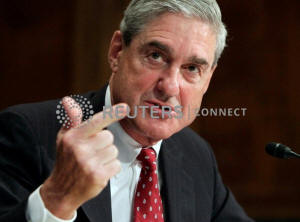|
What happens if Mueller finds Trump
fingerprints in Russia conspiracy?
 Send a link to a friend
Send a link to a friend
 [February 26, 2019]
By Nathan Layne [February 26, 2019]
By Nathan Layne
(Reuters) - Special Counsel Robert Mueller
is preparing to submit to U.S. Attorney General William Barr a report
detailing his findings in the investigation into Russia's role in the
2016 presidential election and any links to the Trump campaign.
Mueller has been looking since May 2017 into whether U.S. President
Donald Trump's campaign conspired with Russia and whether Trump
unlawfully sought to obstruct the probe. Mueller already has indicted or
secured guilty pleas from 34 people, including six associates of Trump,
as well as three Russian entities.
Here is a look at possible scenarios following the completion of
Mueller's report.
REPORT FINDS TRUMP INVOLVED IN RUSSIA CONSPIRACY
Among those who already have pleaded guilty or have been convicted are:
former Trump campaign chairman Paul Manafort; former Trump personal
lawyer Michael Cohen; former national security advisor Michael Flynn;
and former Trump campaign aides Richard Gates and George Papadopoulos.
Others indicted include Trump adviser Roger Stone and Russian
intelligence officers.

But the central question is whether Mueller will find that Trump himself
played a role in a conspiracy with Moscow to boost his chances of
winning the election or committed obstruction of justice to try to
impede the Russia probe. Trump has denied collusion and obstruction.
If Mueller's report reveals a willingness by Trump to collude with
Russia or contains evidence of direct coordination involving the
Republican president, such findings could be the starting gun for the
Democratic-led House of Representatives to launch the impeachment
process set out in the U.S. Constitution to remove a president from
office.
Current Justice Department policy opposes bringing criminal charges
against a sitting president.
Stone's indictment points to instances in which people connected to the
campaign communicated with him about Wikileaks, the website that
released emails that U.S. officials have said Russians stole from
Democrats to harm Trump's Democratic opponent Hillary Clinton. For
example, after a July 2016 release of emails stolen from the Democratic
National Committee a "senior Trump campaign official was directed to
contact STONE about any additional releases" by Wikileaks, the
indictment stated. The sentence's wording left open the possibility that
Trump himself directed the campaign official.
Sam Nunberg, a former Trump aide and Republican political consultant,
said any evidence that Trump was willing to work with Moscow, even
without proof that he actually did that, might be enough for Democrats
to draw up articles of impeachment.
"That's impeachable for the Democrats," Nunberg said.
The U.S. Constitution sets specific grounds for impeachment: treason,
bribery or "other high crimes and misdemeanors." If the House approves
any articles of impeachment, the Senate then would hold a trial to
determine whether to remove the president from office. The Senate is
controlled by Trump's fellow Republicans. Only two presidents have been
impeached in American history, and neither was removed.
There is also the issue of obstruction. Legal experts have pointed to
Trump's firing of former FBI director James Comey while he was leading
the Russia probe, Comey's allegation that Trump asked him to end the
investigation of Flynn, and the president's dangling a possible pardon
to Manafort among other acts that may amount to obstruction of justice.
[to top of second column]
|

Robert Mueller, as FBI director, testifies before the U.S. Senate
Judiciary Committee on Capitol Hill in Washington. Sept. 16, 2009.
REUTERS/Yuri Gripas/File Photo

Barr, months before Trump named him as attorney general, last year
wrote an unsolicited memo to the Justice Department arguing Mueller
should not be permitted to investigate obstruction by the president.
NOBODY IN TRUMP CAMPAIGN IMPLICATED IN RUSSIA CONSPIRACY
Mueller's cases against Manafort and Stone have come the closest to
showing coordination between Trump's campaign and Russia. Manafort
shared election polling data with his Russian associate Konstantin
Kilimnik, who prosecutors have said is tied to Russian intelligence.
Manafort attended a June 2016 meeting at Trump Tower in New York
with other campaign officials with a Russian lawyer who promised
"dirt" on Clinton. Mueller also found that Stone communicated with
Wikileaks and the Russian hacker dubbed Guccifer 2.0.
But Mueller's evidence made public to date falls short of
demonstrating Trump and his campaign colluded with Russia. Collusion
is a non-legal term often used to describe acts that in a criminal
context in this investigation likely would translate to a charge of
conspiracy against the United States.
If Mueller's report goes no further, it could set back any
Democratic effort to impeach Trump. But House Democrats could
proceed with their own investigations that could cause Trump ongoing
political damage heading into his 2020 re-election bid.
"If nothing more comes out than what is public then I think Trump
could claim victory," said Nelson Cunningham, a former federal
prosecutor in New York and White House lawyer under Democratic
President Bill Clinton.
REPORT IMPLICATES OTHERS IN CONSPIRACY BUT NOT TRUMP
Transcripts of closed court hearings this month indicated Mueller
considers Manafort's alleged lies about his interactions with
Kilimnik to be "at the heart" of the probe into possible collusion
between Trump's campaign and Russia.
But that disclosure suggested Mueller was still trying to determine
whether collusion occurred. In addition to sharing polling data,
court filings show, Manafort and Kilimnik discussed a "Ukrainian
peace plan," a reference to Kremlin-friendly proposals to resolve
the Ukraine conflict and end U.S. sanctions on Russia.

It is possible Mueller's report will show that Manafort or others in
Trump's orbit conspired with Russians but there was no credible
evidence Trump himself was involved or aware. While politically
damaging to Trump, such a finding may not be enough to trigger an
impeachment effort, though it could fuel House committee
investigations.
"It's not enough to show the Russians used their people," said
Robert Ray, who served as the second independent counsel in the
1990s Whitewater probe involving the Clintons' business dealings,
adding there would need to be proof that Trump's people actively
colluded to the point that it violated the law.
"I don't think it occurred," Ray said.
(Reporting by Nathan Layne in New York; Additional reporting by
David Morgan in Washington; Editing by Will Dunham)
[© 2019 Thomson Reuters. All rights
reserved.]
Copyright 2019 Reuters. All rights reserved. This material may not be published,
broadcast, rewritten or redistributed.
Thompson Reuters is solely responsible for this content. |